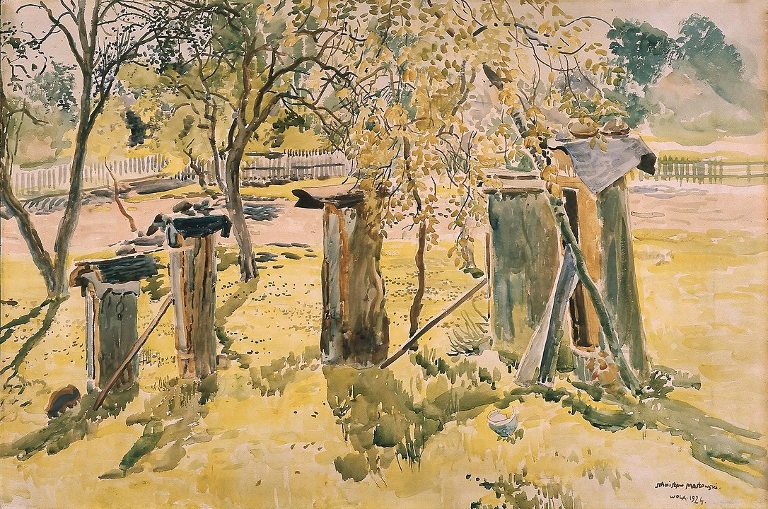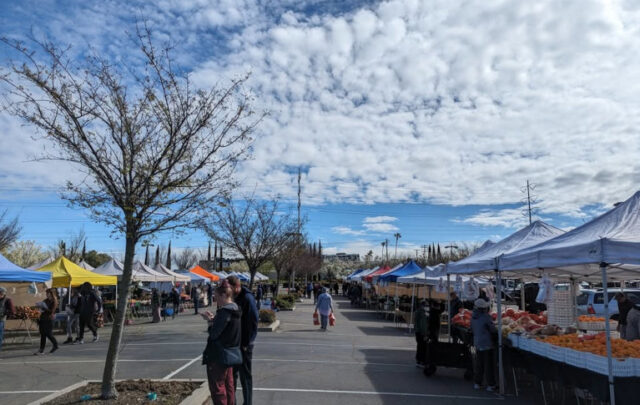Richard Powers’ The Overstory is a big novel of ideas about humans and the natural world that will keep me thinking long after turning the final page. Here I just want to pick up on one among many of its themes and offer a few brief reflections on it, perhaps as the final curtain to the present trio of posts on collapse.
In response to an episode of (male) violence between strangers, followed by a linked episode of (male) domestic violence, Powers puts this thought into the mind of one of his protagonists: “Humankind is deeply ill. The species won’t last long. It was an aberrant experiment. Soon the world will be returned to the healthy intelligences, the collective ones. Colonies and hives.”
Reviewing the book in The Guardian, Benjamin Markovits wrote “It’s hard not to feel that something slightly antihuman has crept into the philosophy”. Maybe the quotation above is a case in point (and there’s much else in the book that one could use to prosecute Markovits’ view).
But I’d like to press a different line of reasoning. Is humankind deeply ill? I’m not sure that’s so when we think about our species as an aggregate of its individuals. Certainly, there are some ill or alienated people among us who cause a lot of damage. But maybe that’s true of other species. In one study of a seagull colony, almost one in four chicks were eaten by adult birds, the majority by just four individual gulls – one of whom ate his own offspring while allowing a chick he’d stolen and brought back to his nest to survive. Seabird colonies seem rather like human slums, with the majority flocking together because that’s what they need to do to get by, but thereby making themselves vulnerable to predatory violence.
Maybe we’ll get somewhere different if we think about illness at the collective level. The constant refrain of cultural critics down the ages is that present society has lapsed into a sick, decadent or fallen state. And the pushback is often something along the lines of Markovits – that this is an anti-human, or misanthropic or elitist position that maligns the ordinary struggles of everyday people. This kind of trick is often pulled by ‘eco-modernists’ and other peddlers of business-as-usual porn – that theirs is the pro-human position, while any wider cultural critique is mere nihilism or misanthropy. However, the point of cultural critique isn’t to wallow in nihilism, but to diagnose the source of the malaise in order to improve the human condition. So, for me, to talk of humanity’s deep illness isn’t necessarily anti-human. I read the line in Powers’ novel as an invitation to human improvement. And an urgent one, as earth systems collapse around us, threatening our own wellbeing and that of other species.
Yet when I think about how to overcome that human illness and the perturbation in earth systems that it’s causing, I come to a different endpoint to Powers’ character on the matter of healthy intelligences. Because it strikes me that the malaise lies precisely in the way that we have made ourselves over into a hive culture.
The collective intelligence of humanity is that of the social ape, not the hive insect. Maybe the life history that most fits us to thrive is creating our livelihoods as competent, generalist individuals working within small collectivities – families, bands, settlements. Those in turn may be part of larger culture areas, with shared languages and cosmologies and their own inherent ideological tensions, but the arrow of life’s activities is directed at the local specifics of wresting a personal livelihood alongside others in the community.
Yet when I think about modern life, the metaphor of the hive of social insects presents itself. I don’t want to over-press it, because clearly there are differences and the mechanisms aren’t the same. But we’ve created a world with a ruling caste of queens and drones who determine the parameters of our hive, and a multitude of dependent workers who enact it, who are unable to exist independently of it, but who derive small individual benefit from it beyond the fact they no longer have the capacity to exist outside it. Among the social insects, and particularly among the worker majority, that patterning so far as we know seems to create no tension because, genetically and biologically, that’s what they’re built to act out. But it’s not entirely what humans are built to act out, and it strikes me that a lot of our illness (metaphorical and probably actual) – so much frustrated desire, so much ressentiment – may stem from this mismatch between what we’re built to do and what we actually do. Inasmuch as humankind is ill, maybe it’s because we’ve tried to fit ourselves into a collective intelligence, into a hive mind, where we scarcely belong.
Perhaps this too is why so much of the wider biological world has become ill as a result of the human hive. Powers recognizes this elsewhere in his novel: “That’s the scary thing about men: get a few together with some simple machines, and they’ll move the world.” When I lived for a time in the rainforests of British Columbia I was struck by how much of their old growth extent had been levelled by people with fairly rudimentary technologies by today’s standards – manual saws, winches, logging roads – long before the industrialized destruction of chainsaws, forwarders and feller-bunchers had been invented. The secret of that destruction was human social organization, not technological development, and the secret of the social organization was preventing people from making a competent personal livelihood in their own backyards. The militarized, masculine, hive discipline of the logging camp and its analogues is a not a healthy intelligence for humankind.
Again, the pushback against such views always addresses the benefits that humankind has brought to itself through its vast collective organization – modern health and wealth, the plethora of consumer goods on which our contemporary culture dotes, and all the rest of it. But I think we need to stop looking at ourselves in the mirror of the past and liking what we see so much, instead addressing the dramatically dangerous trade-offs that our modern hive intelligence poses for us in the here and now. More importantly, I think we need to address the possibility that a world of human autonomy outside the hive might suit us better.
I was struck by this when I read Maarten Boudry’s response to the critique of his anti-localism article that I published in my last post. Boudry wrote,
“Now of course you can try to satisfy consumer demand in radically different ways (e.g. artificial meat), but you can’t just IGNORE the demand. I get the distinct impression that, in @csmaje’s ideal future, we won’t be able to choose what to eat, nor where to live.”
It surprises me to read such dismissiveness about a supposed future where “we won’t be able to choose what to eat, nor where to live” when so few of “us” in the present world have such choices. But, more importantly, Boudry seems to be assuming that consumer demand is something that just bubbles up sui generis, with economic systems arising to meet it and thereby making “us” happy. I struggle to see this as much more than a delusion from a limited vantage point within the capitalist hive – one that insists we must admire only the intricate architecture within, rather than looking at the bigger world outside, and its universe of different possibilities.
In my forthcoming book, I provide a somewhat less admiring appraisal of the capitalist hive, and an alternative narrative about the search for human self-possession and autonomy that might make us seek a different habitat from choice as much as necessity. So I reject Boudry’s implication that I seek to coerce people into my ‘utopia’ (oh well, at least he didn’t mention the Khmer Rouge). I think people can easily find fulfilling localisms for themselves, given the opportunity. Nor, I suspect, will consumer demand lead in the future quite where Boudry thinks. The two main businesses in which I have some involvement – a small, local market garden and a small campsite – have been inundated with customers since the Covid-19 outbreak as a result of the fracturing of the larger economic structures it caused. In the short-term, that fracturing may or may not diminish, but in the long-term I think it will prove the merest tremor to the changes that are afoot. ‘Consumer demand’ will follow.
For these reasons, I think I absolutely can ignore consumer demand in its present incarnation. Instead, let me herald producer demand. Let everyone occupy their 1.6 acre share of global farmland, then raise as much (non-artificial) livestock for meat as they possibly can, should they wish. It’ll turn out to furnish them with much less meat than the average North American or Western European currently eats, but the living animals will do a lot of other useful work on the farm. And I’m not sure the producers will be significantly less happy than the average consumer in today’s world. The difficulty is the transition from today’s consumerism to that future producerism, not the lure of the producerist endpoint.
The journalist Rafael Behr writes in a different (but related context):
“People are perfectly able to understand the concept of a painful trade-off because they occur in life all the time. All but the most privileged minority are forced to choose between what they want and what they can afford. All but the most selfish among us understands the need sometimes to suppress selfish impulses in favour of duty towards others. There are only a few who find that concept challenging.”
I might go further and argue that accepting painful trade-offs can make us happy, and part of our contemporary illness is in supposing otherwise – often at the behest of the few who think that selfish impulses lead to collective benefit (there’s a whole sub-theme here on virtue versus vice as the motive force of collective intelligence that we could pursue through intellectual history from Bernard Mandeville to E.O. Wilson – but let’s leave that for another day).
Boudry calls future producerist visions of the future such as mine a ‘pipedream’. He’s probably right. As I see it, every positive vision of the future now is more or less a pipedream, certainly including his notion that we should “retreat to a smaller area and “decouple” from the landscape, so that we can give as much land as possible back to nature”. All I’ll say here is that there are increasing numbers of people who have started to look outside the hive and find pipedreams like mine more appealing than pipedreams like Boudry’s. This is just as well, because I think the future is more likely to look like my pipedream than his.
Well, perhaps I’ll say just one more thing. There’s a gender dimension to this discussion that I haven’t highlighted, but I think is interesting. The violence investing the moments of Richard Powers’ novel was male, and so perhaps is the violence that’s invested the construction of our contemporary human hive. Powers’ ‘healthy, collective intelligences’ of colonies and hives, on the other hand… Well, it’s only a thought.
Teaser photo credit: By Stanisław Masłowski – Silesian Museum in Katowice, Public Domain, https://commons.wikimedia.org/w/index.php?curid=38367774






